Shutesbury voters back battery storage bylaw at Town Meeting
|
Published: 04-28-2024 11:01 AM
Modified: 05-08-2024 6:19 PM |
SHUTESBURY — Voters gave their blessing to a new bylaw regulating large-scale battery storage and 27 other articles at Saturday’s Annual Town Meeting, with votes on adopting a specialized energy code for buildings and enacting a solicitation bylaw both being postponed indefinitely.
Residents also approved a nearly $7.21 million fiscal year 2025 operating budget with a 6% increase to the town’s assessment for the Amherst-Pelham Regional Public Schools.
The solicitation bylaw, presented by Police Chief Kristin Burgess in Article 25, would require people canvassing in town to have a registration certificate, which would be valid for up to 60 days. However, after several amendments to the bylaw’s language were proposed on the Town Meeting floor, including to add a definition of solicitation and to specify that the regulation would apply only to for-profit entities, the town decided to hold off on approving the bylaw until a future Town Meeting, where the fully revised language will be presented.
As for the specialized energy code, which would regulate the design and construction of buildings in a way that would reduce greenhouse gas emissions, Planning Board member Michael DeChiara explained that the town learned it must hold a public hearing on the matter before it can proceed with a Town Meeting vote.
The article that inspired the most discussion at Shutesbury Elementary School, however, pertained to adopting a Municipal Energy Storage General Bylaw to regulate large-scale battery storage. The bylaw, adopted by majority in Article 26, allows small-scale energy storage systems with a net generation capacity of less than 1 megawatt by right, while systems with a capacity between 1 and 10 megawatts must receive approval from the new seven-member licensing board created in the bylaw. Energy storage systems with a net generation capacity greater than 10 megawatts will be prohibited.
DeChiara, in presenting the bylaw, spoke to the challenge of putting out lithium ion batteries, in particular, if they were to catch fire and the toxic substances that are released when that happens. Given that 92% of the land in Shutesbury is forested, such a scenario would put the town at risk of forest fires.
“It’s not like this is theoretical,” DeChiara said, pointing to the 105-megawatt battery storage facility proposed in Wendell. “It’s happening in our neighboring community.”
Residents expressed a desire to preserve forests while also embracing technology that will help the state reach its net-zero emissions goal by 2050.
Article continues after...
Yesterday's Most Read Articles
 Longtime Orange public servant Richard Sheridan dies at 78
Longtime Orange public servant Richard Sheridan dies at 78
 As I See It: Between Israel and Palestine: Which side should we be on, and why?
As I See It: Between Israel and Palestine: Which side should we be on, and why?
 Retired police officer, veteran opens firearms training academy in Millers Falls
Retired police officer, veteran opens firearms training academy in Millers Falls
 Deerfield’s Tilton Library expansion ‘takes a village’
Deerfield’s Tilton Library expansion ‘takes a village’
 Big turnout expected Sunday for 14th annual WMass Mother’s Day Half Marathon in Whately
Big turnout expected Sunday for 14th annual WMass Mother’s Day Half Marathon in Whately
 High Schools: Big sixth inning propels Franklin Tech past Smith Vocational (PHOTOS)
High Schools: Big sixth inning propels Franklin Tech past Smith Vocational (PHOTOS)
“The only means we have to draw down the amount of carbon that is in the air is forests,” commented resident Carlos Fontes. “Any measure that protects the forest, to me, seems wise.”
Resident Anna Heard advised the town to be cautious about unnecessarily restricting energy storage projects.
“I think we should focus instead on making sure that the projects are safe and maintained … and adequately planned so that if there are problems, they will not leak toxic chemicals into our aquifers,” she said. “We need to be very careful about the restrictions that we’re placing so we don’t regulate ourselves out of the possibility of getting to net-zero.”
Resident April Stein voiced her belief that the town has the opportunity to set an example in crafting a bylaw that can make energy storage work for a small community, with DeChiara and resident Tracy McNaughton adding that the bylaw can always be revised later.
“It could be that 10 megawatts is off and we need to adjust, but at this point we have to do something because there is nothing,” DeChiara said, referencing the lack of state regulations on energy storage systems.
“This isn’t something that’s an end-all, be-all,” McNaughton added. “As the technology changes, we can change.”
The final two articles passed were two citizen’s petitions: one calling on the Selectboard to “urge our legislators and governor to end state incentives to site large-scale ground-mounted solar installations on connected forested land.”
Resident Jane Urban pitched her petition to voters by approaching the microphone, cellphone in hand, and playing audio of birds chirping.
“Is this not why we all live here in Shutesbury?” she asked. “Most of us choose to live here because of the natural beauty. … We know how lucky we are and many of us feel very protective.”
Though Urban clarified she is not against solar energy, she and her group, Forest Allies for Responsible Solar, feel that clear-cutting forests to site large-scale solar arrays “is not the answer.”
Town counsel Donna MacNicol clarified that the petition is a nonbinding referendum that “expresses the basic sentiments of the town, but does not technically have any legal strength.”
“It’s a way to give voice to what we feel,” Urban added, “and hopefully our elected officials will listen.”
A second citizen’s petition would give non-citizens the right to vote in local elections and at Town Meeting, as well as serve on town boards and committees.
Resident Matteo Pangallo said such a measure would increase the pool of residents who can serve on town boards and committees that struggle to find volunteers, expand the perspectives represented in town government, and correct “an affront to one of our most basic human rights” by allowing non-citizens to vote in local elections and at Town Meeting.
Other articles that were a bylaw to limit outdoor light pollution; $150,000 to continue cleanup of contamination from so-called forever chemicals on Leverett Road; $12,000 for new body cameras and related software for police; $70,588 for a police pickup cruiser; $29,500 for a storage unit, generator and propane tank for the Highway Department; and $12,000 to rebuild portions of gravel roads.
Three hundred and sixteen voters cast their ballots in Saturday’s election, electing the following town officials:
■Wm Levine and Arleen Reed to the Board of Health, both for three-year terms.
■Susan Millinger and Dina Stander to the Cemetery Commission, both for three-year terms.
■Eric Stocker to Selectboard for a three-year term.
■Elizabeth Murphy as library trustee for a two-year term, and Katherine Cell and Pam Ososky for three-year terms.
■Graeme Sephton to a two-year seat on the Municipal Light Plant Board and Stephen Schmidt to a three-year seat.
■Ashleigh Pyecroft to a one-year term on the Planning Board, and Nathan Murphy and Jeff Weston to three-year terms.
■Nathaniel Longcope (write-in candidate) to a one-year term on the School Committee, and Leah Jack to a three-year seat.

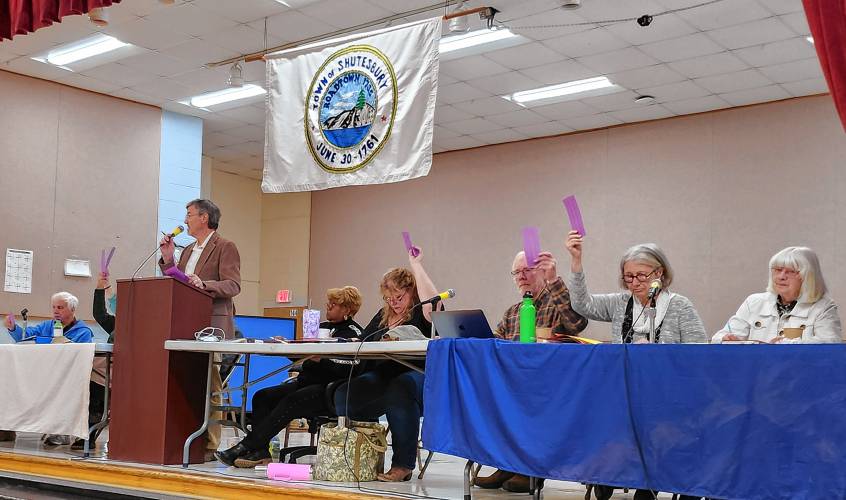
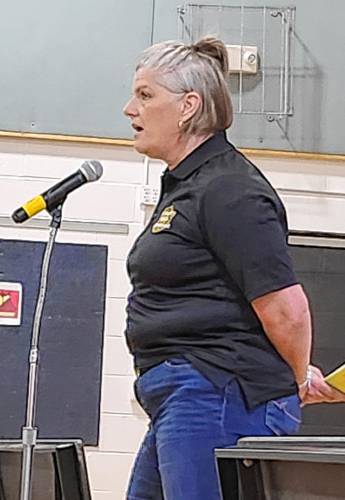
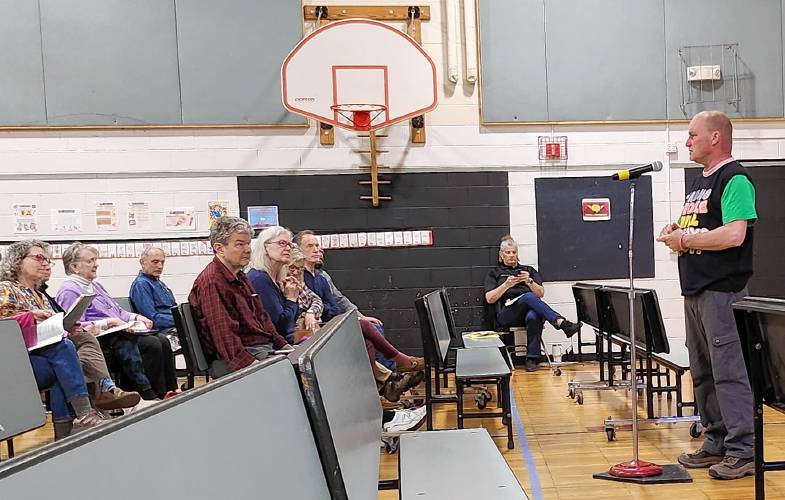
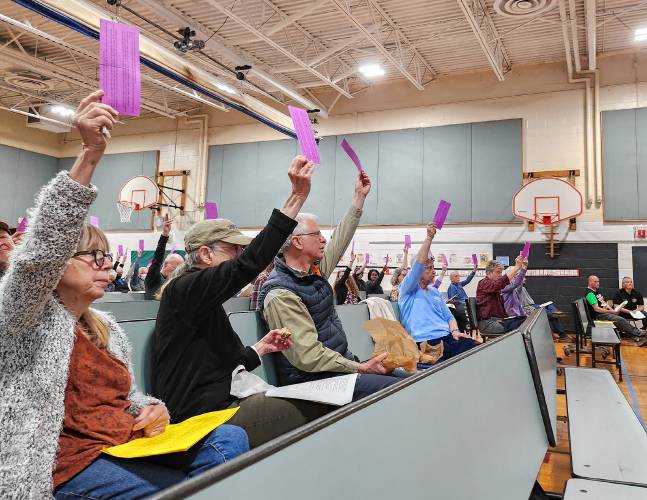
 New USDA offices in Greenfield to aid staffing increase, program expansion
New USDA offices in Greenfield to aid staffing increase, program expansion Montague Notebook: May 10, 2024
Montague Notebook: May 10, 2024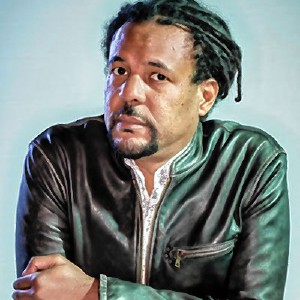 UMass graduation speaker Colson Whitehead pulls out over quashed campus protest
UMass graduation speaker Colson Whitehead pulls out over quashed campus protest
